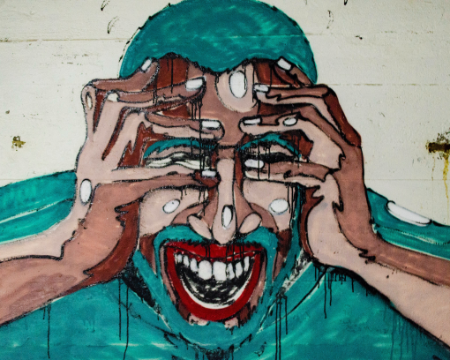
My body was giving me all the clues like lights on a car dashboard. Trouble concentrating, forgetful, irritable, fearful, tense all over, overwhelmed. Like all of Spain, my city had gone into lockdown literally overnight. The rest of the countries of the world followed like falling dominos. My brain and body did as well.
As a Mental Health Counselor I recognized all the signs of anxiety. As a human being I felt the vulnerability that brought it on. Now, we are on day 25. For that many days I have been paying attention to my own body and heart, and trying to make the needed daily adjustments.
Anxiety is our common human experience. In fact, to be human is to know anxiety. This includes adults and children of every age. Like all emotions, it is God-given and intended to give us vital information about the world around us, so that we can make our wisest next move. Therefore, our goal is not necessarily to be anxiety-free, but to use our awareness of anxiety to move through the experience towards peace. Right now, that may be a day-by-day or moment-by-moment effort. This becomes vital for parents who must do this work in order to provide a safe place for kids to navigate these times.
The most helpful definition of anxiety I’ve learned is the loss of control. We experience an alarm, warning us of some real or perceived threat or danger. So, when I’m anxious, I ask myself “What feels out of control?” During this pandemic, the answer is: a LOT! It’s real. Our health, our finances, providing what our children may need, access to safe healthcare, our routines, helping others, our entire future, and so much more. We are in an open-ended state of alarm that has never been seen before in our lifetimes, so there are no guidelines for living this life. We’re learning as we go.
No wonder we are anxious!
One of the most important postures for ourselves and our loved ones during this time is “grace”. Grace means more than giving someone the benefit of the doubt; grace is a positive attitude that believes that we are all doing our best, even when it looks slow and messy and different for every person. Your spouse is doing their best. Your kids are doing their best. You are doing your best. Even if there is room to grow.
Conversely, our “shame” messages tell us that we are wrong or flawed, and push us further into distress. They separate us from others. In this time, individuals and families need to extend eachother grace more than ever in order to stay a team.
The Bible says that we are “Fearfully and wonderfully made”. God’s intention is for our bodies, brains, and hearts to be working together for our flourishing. Many times, our bodies and brains are doing just that, but we may not recognize it as a gift. Our need in this time is to notice our system’s cues, identify what we need, and make choices that put us in the position to re-experience peace.
To let us know that there is some threat or danger, our bodies and brains go into action. The tell tale warnings are symptoms like stomach or headaches, sweating, a racing heart, insomnia, overthinking, constant worrying, avoidance and other symptoms. These all point to our system’s attempt at regaining equilibrium.
So, how do we move towards re-experiencing the peace that God offers us in anxious times? It’s futile to focus on controlling our emotions. But we “read” them as information to determine what we need as the wisest next step. What we most need now is a steady dosing of regulating- calming, stabilizing- people and practices that help us build resilience.
Here are some tips that have been helpful for me:
Practices:
Deep Breathing: When life feels out of control, we can at least control our own breathing. There are scientifically proven positive effects of slow, deep breathing from our diaphragm. We may add to that a “breath prayer” that connects us with God, such as “I am not alone” (on the inhale), “You are here” (on the exhale).
Focus on now: We only have grace for now. Anxiety is often future-focused, so ask, “What is true now?” It’s also important to remember that action reduces anxiety. Asking, “What can I/we do now?” increases your sense of control, which decreases distress.
Be the gatekeeper: We are wise to be very vigilant about the amount of one-way information we are taking in on our media. This is not just the scary or sad news, but also the overwhelming amount of ideas on schooling, crafts, house projects that can become overwhelming.
Personal connections: What we most need for regaining our well-being is nourishing interactions with our own selves, others, and God. Being seen and heard right where we are, and accepted, has proven power to help us heal and move towards growth. We have the privilege of being co-regulators of each other.
Rhythms: Establishing routines is something that gives us a sense of control. We need it. Kids need it. However, we must guard against rigidity and maintain some sense of flexibility. I have found that a 3-5 minute morning routine that helps me start the day paying attention to myself and God is realistic. Coffee, a few deep breaths, a prayer for my day. If it’s more, great, but I can realistically commit to at least 3 minutes.
On this new and unexpected journey, we need new levels of grace and resolve. I want to believe for myself and for you that we are collectively becoming more attuned, more empathetic, more committed to a life lived in wisdom and love. We will emerge from this changed in beautiful ways.
ABOUT THE AUTHOR – Sandy Fernandez Trzcinski is a Licensed Mental Health Counselor and Registered Play Therapist that works to help people living and working globally flourish. Along with her husband, John, she leads Staff Care for Agape Europe.
Do you know what you are feeling? How easy or difficult do you find it to talk about your emotions? The Toucan Communication Module helps you identify your own emotions and talk about them as a couple to grow in understanding and intimacy.



